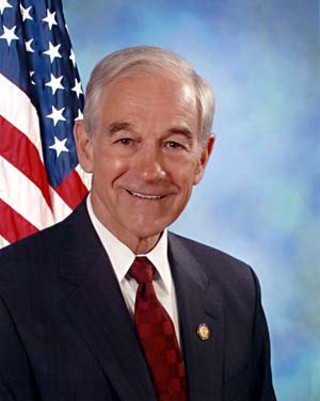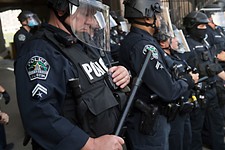Is Ron Paul A Domestic Terrorist?
One fusion center apparently thinks so
By Jordan Smith, 6:59AM, Wed. Sep. 12, 2012

At best, so-called "fusion centers," law enforcement intelligence gathering operations, can enhance public safety. At worst, they pose a threat to privacy, religious freedom and free speech – and in some places that's exactly what's happening, according to a new report released this week.
Fusion centers were created in the aftermath of the terrorist attacks of 9/11 to "detect and defend" against potential terrorist threats. The centers work as information-sharing hubs that "facilitate the exchange of critical information among federal and state law enforcement, intelligence agencies, and sometimes even military officials and private sector entities," reads the new report, "Recommendations for Fusion Centers: Preserving Privacy & Civil Liberties While Protecting Against Crime and Terrorism," released by The Constitution Project, a nonpartisan think tank.
And while the idea may be to ferret out and thwart evil-doers, in practice there are problems within the nation's 77 centers, which have drawn a fair amount of public concern and criticism. "The very nature of the fusion center network raises the stakes. In such an interconnected system, fusion centers – even those with the best civil liberties practices – can inadvertently perpetuate or exacerbate the problematic activities of other fusion centers of law enforcement agencies," reads the report. Indeed, the local fusion operation, the Austin Regional Intelligence Center, has been the subject of public mistrust related to the scope of its mission and concerns about privacy.
The new report highlights a number of disturbing fusion center-related intelligence gathering incidents from across the country – the risk assessment report released by the Virginia Fusion Center noting that student groups at historically black colleges were breeding grounds for terrorism; a Missouri-based center's report that support for Ron Paul's presidential bid was a sign of membership in a domestic terrorist group; the federal government's direction to the Oakland, Calif., police department that it would be required to question Muslim-Americans based on a policy it "refused to provide" to the local police department.
Ultimately, the report suggests a number of areas for reform, including in data collection and storage, private sector partnerships, oversight, and redress procedures.
You can find the entire report here.
Got something to say on the subject? Send a letter to the editor.
A note to readers: Bold and uncensored, The Austin Chronicle has been Austin’s independent news source for over 40 years, expressing the community’s political and environmental concerns and supporting its active cultural scene. Now more than ever, we need your support to continue supplying Austin with independent, free press. If real news is important to you, please consider making a donation of $5, $10 or whatever you can afford, to help keep our journalism on stands.
Jordan Smith, Oct. 22, 2013
Jordan Smith, Oct. 18, 2013
Austin Sanders, Feb. 16, 2023
Austin Sanders, Feb. 3, 2023
May 22, 2014
Cops, Austin Police Department, fusion centers, Austin Regional Intelligence Center, police, The Constitution Project, terrorism, Ron Paul, privacy, free speech












